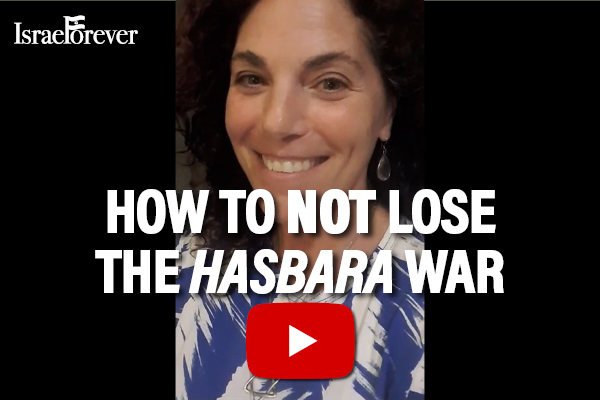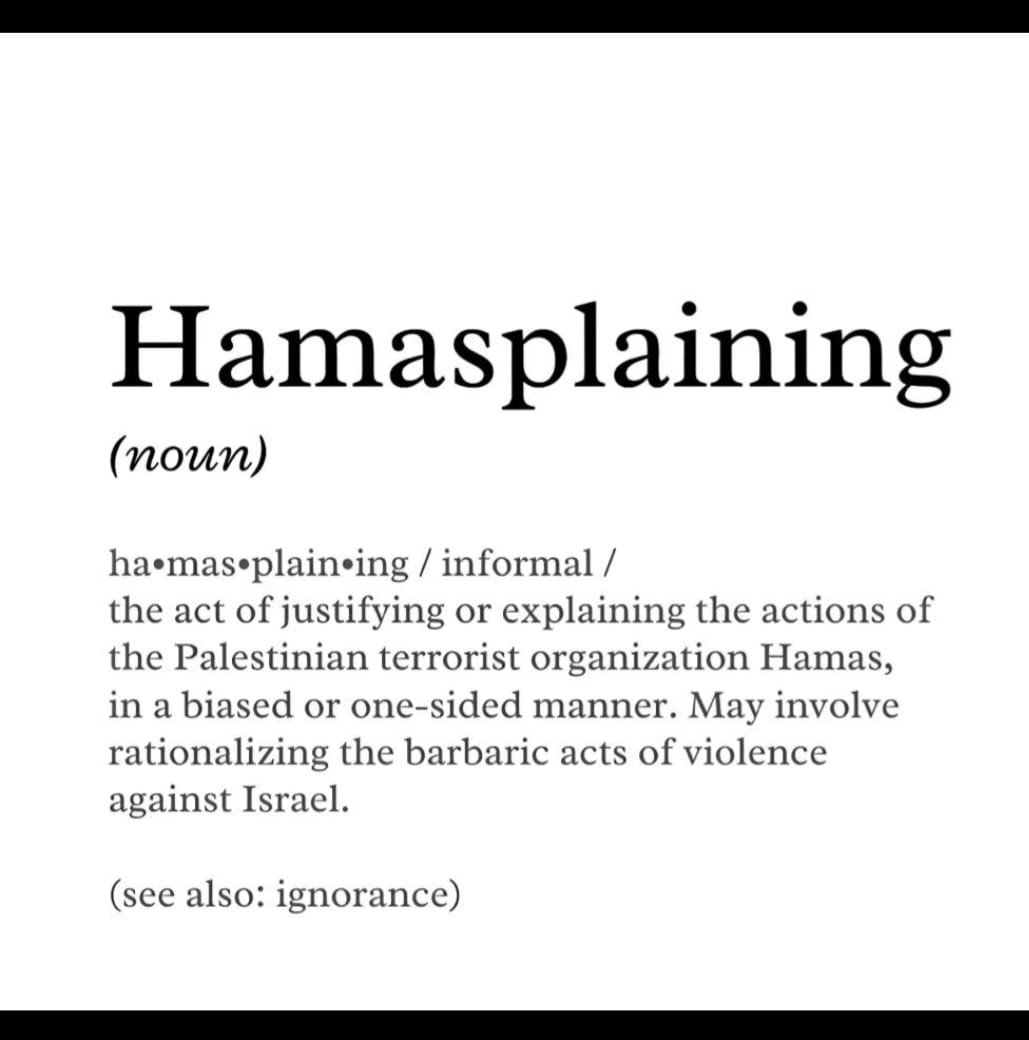How and Why Reporters Get Israel So Wrong, and Why It Matters
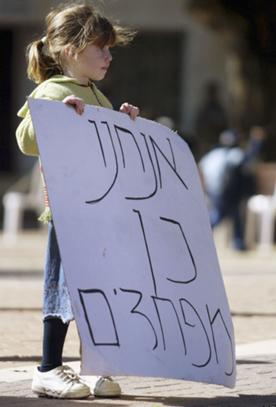
"Yes, we are afraid"
By Matti Friedman
Is there anything left to say about Israel and Gaza?
When the hysteria abates, I believe the events in Gaza will not be remembered by the world as particularly important. People were killed, most of them Palestinians, including many unarmed innocents. I wish I could say the tragedy of their deaths, or the deaths of Israel’s soldiers, will change something, that they mark a turning point. But they don’t. This round was not the first in the Arab wars with Israel and will not be the last.
The Israeli campaign was little different in its execution from any other waged by a Western army against a similar enemy in recent years, except for the more immediate nature of the threat to a country’s own population, and the greater exertions, however futile, to avoid civilian deaths.
You will not know true fear until you experience an explosion a few feet from your home and then scurry to your television set to see what may have happened or who may have been wounded, only to find the latest rotation of reality TV shows.
You will not understand true rage until a rocket explodes in your backyard and you do not find so much as a single mention of it in the following day's newspapers.
You cannot feel the frustration we felt after the IDF chief of staff told us to return to our homes, while the defense minister - despite his security detail and armored cars - canceled his visit to the area because the situation was just too dangerous.
The lasting importance of this war, I believe, doesn’t lie in the war itself. It lies instead in the way the war has been described and responded to abroad, and the way this has laid bare the resurgence of an old, twisted pattern of thought and its migration from the margins to the mainstream of Western discourse - namely, a hostile obsession with Jews.
The key to understanding this resurgence is not to be found among jihadi webmasters, basement conspiracy theorists, or radical activists. It is instead to be found first among the educated and respectable people who populate the international news industry; decent people, many of them, and some of them my former colleagues.
While global mania about Israeli actions has come to be taken for granted, it is actually the result of decisions made by individual human beings in positions of responsibility - in this case, journalists and editors. The world is not responding to events in this country, but rather to the description of these events by news organizations.
The key to understanding the strange nature of the response is thus to be found in the practice of journalism, and specifically in a severe malfunction that is occurring in that profession - my profession - here in Israel.
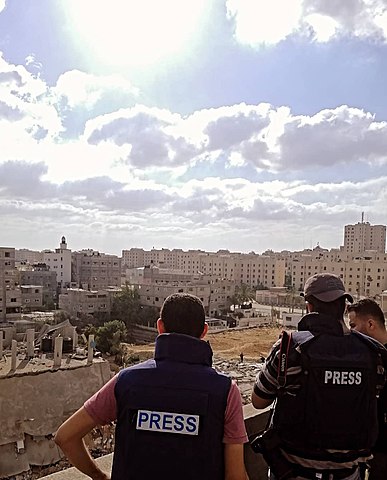
Journalists filming in Gaza. Photo credit: Osps7 on Wikimedia Commons
How Important Is the Israel Story?
When I was a correspondent at the AP, the agency had more than 40 staffers covering Israel and the Palestinian territories. That was significantly more news staff than the AP had in China, Russia, or India, or in all of the 50 countries of sub-Saharan Africa combined. Before the outbreak of the civil war in Syria, the permanent AP presence in that country consisted of a single regime-approved stringer.
News organizations have nonetheless decided that this conflict is more important than, for example, more than 1,600 women murdered in Pakistan (271 after being raped and 193 of them burned alive), the ongoing erasure of Tibet by the Chinese Communist Party, the carnage in Congo or the Central African Republic, and the drug wars in Mexico, let alone conflicts no one has ever heard of in obscure corners of India or Thailand. They believe Israel to be the most important story on earth, or very close.
What Is Important About the Israel Story, and What Is Not?
The Israel story is framed in the same terms that have been in use since the early 1990s - the quest for a “two-state solution.” It is accepted that the conflict is “Israeli-Palestinian,” meaning that it is a conflict taking place on land that Israel controls - 0.2 percent of the Arab world - in which Jews are a majority and Arabs a minority.
The conflict is more accurately described as “Israel-Arab,” or “Jewish-Arab” - that is, a conflict between the 6 million Jews of Israel and 300 million Arabs in surrounding countries. (Perhaps “Israel-Muslim” would be more accurate, to take into account the enmity of non-Arab states like Iran and Turkey, and, more broadly, 1 billion Muslims worldwide.) This is the conflict that has been playing out in different forms for a century, before Israel existed, before Israel captured the Palestinian territories of Gaza and the West Bank, and before the term “Palestinian” was in use.
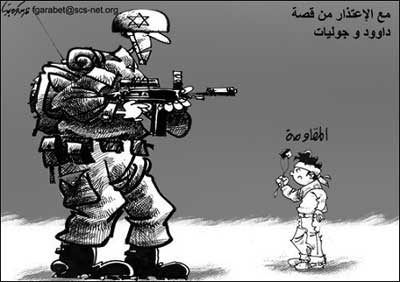
The cartoon’s headline: “We apologize to the story of David and Goliath.” On the right is the “Resistance.” Ar-Raya
The “Israeli-Palestinian” framing allows the Jews, a tiny minority in the Middle East, to be depicted as the stronger party. It also includes the implicit assumption that if the Palestinian problem is somehow solved the conflict will be over, though no informed person today believes this to be true. This definition also allows the Israeli settlement project, which I believe is a serious moral and strategic error on Israel’s part, to be described not as what it is - one more destructive symptom of the conflict - but rather as its cause.
Reporters generally cannot see the Israel story in relation to anything else. Instead of describing Israel as one of the villages abutting the volcano, they describe Israel as the volcano.
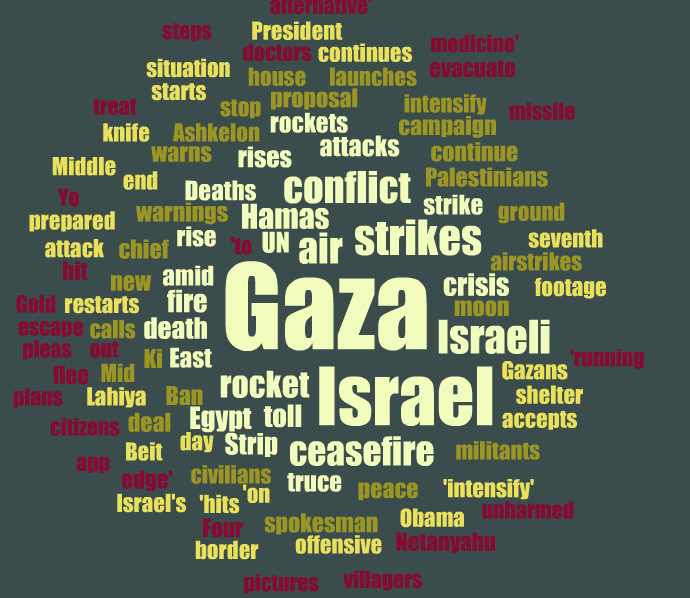
Israel is not an idea, a symbol of good or evil, or a litmus test for liberal opinion at dinner parties. It is a small country in a scary part of the world that is getting scarier. It should be reported as critically as any other place, and understood in context and in proportion. Israel is not one of the most important stories in the world, or even in the Middle East; whatever the outcome in this region in the next decade, it will have as much to do with Israel as World War II had to do with Spain.
Israel is a speck on the map - a sideshow that happens to carry an unusual emotional charge.
You don’t need to be a history professor, or a psychiatrist, to understand what’s going on. Having rehabilitated themselves against considerable odds in a minute corner of the earth, the descendants of powerless people who were pushed out of Europe and the Islamic Middle East have become what their grandparents were - the pool into which the world spits.
The Jews of Israel are the screen onto which it has become socially acceptable to project the things you hate about yourself and your own country. The tool through which this psychological projection is executed is the international press.
Questions for Consideration:
- What is your answer or proposal?
- What more can we do as a people to understand and make a difference?
- How can understanding the fear of those living under constant attack for decades force us towards action?
Read the full article HERE

